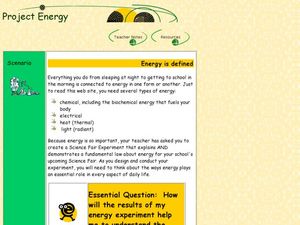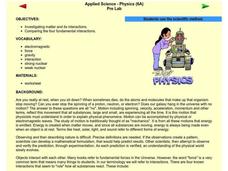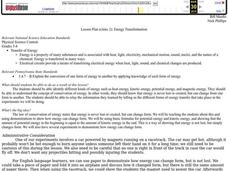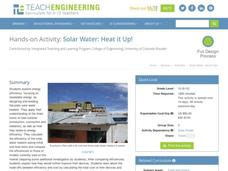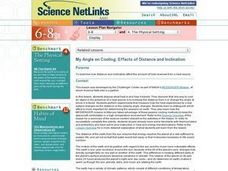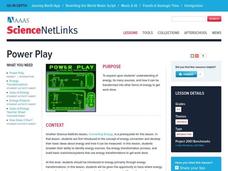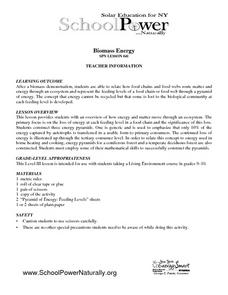Curated OER
Potential and Kinetic Energy
In this kinetic and potential energy worksheet, students read about energy of position and energy of motion and are given the equations to find each. Students match 11 terms with their definitions about both types of energy and the...
Curated OER
Energy Detectives at Work
Students are "Energy Detectives" working for an engineering firm that does energy evaluations at schools. In teams, they locate energy sources around the school, and record their findings on an Energy Detective Worksheet.
Curated OER
Project Energy
Young scholars explore multiple types of energy. In this energy lesson, students prepare a science fair project through completing a WebQuest. Young scholars investigate radiant, thermal, and biochemical energy.
Curated OER
Energetic Energy: A Child?s Guide to Responsible Energy Use
Students explore how energy transforms into heat. For this energy lesson students create models and find a need for fuel to make a Stirling engine.
Curated OER
Matter and Energy
Students explore energy by completing a science worksheet in class. For this principles of matter lesson, students define the vocabulary terms force, gravity, nuclear, and electromagnetic before reading assigned text about energy....
Ocean Explorer
Living with the Heat
Young oceanographers study the Submarine Ring of Fire, which is a series of deep-water volcanic vents that come up from the ocean floor. Learners take a close look at the unique ecosystems that are associated with these areas, how these...
Curated OER
Energy Transformation
Students identify different kinds of energy such as heat energy, kinetic energy, potential energy, and magnetic energy. They investigate the concept of conservation of energy.
Curated OER
Methods of Heat Transfer
Eighth graders discuss the forms of heat transfer that relate to the human body. Discussion revolves around the ability of different designs of hats to change the rate of heat transfer to and from the body. Students then experiment...
Curated OER
Energy Activities
Students conduct a variety of experiments related to solar energy, heating, cooling, gravity, physical insulation and wind. They consider how the experiments relate to energy and the consumption of energy and then participate in a class...
University of Waikato
Māui and the Sun
Using a Maori legend, How Maui Tamed the Sun, youngsters are introduced to the importance of sunlight to civilization. Teach them about nuclear fusion that occurs to produce the solar energy we later receive on Earth as electromagnetic...
Texas State Energy Conservation Office
Investigation: Waves and Whistles
Wave goodbye to the same old demonstrations for alternative energy sources, and wave hello to this one investigating ocean waves! Using a water bottle to create an oscillating water column, learners see and possibly hear how the...
Texas State Energy Conservation Office
Power Systems & Efficiency
Are you looking for a reading resource about the efficiency of power systems? Here is one that introduces the output/input ratio, measurement of energy by joules or calories, and efficiency ratings. For STEM classes that are learning...
Teach Engineering
Solar Water: Heat it Up!
Young engineers are instructed to design and build their own solar water heaters. Then, they calculate the efficiency and cost and compare them to commercially available models. This is a full unit for pupils to apply their knowledge.
Biology Junction
Photosynthesis: Energy and Life
All life requires energy ... and the connection between energy and plant life typically requires photosynthesis. Scholars explore photosynthesis in depth from ATP/ADP through the Calvin cycle. A helpful presentation highlights concepts...
Curated OER
My Angle on Cooling: Effects of Distance and Inclination
Students discuss what heat is and how it travels. They discover that one way to cool an object in the presence of a heat source is to increase the distance from it or change the angle at which it is faced.
Curated OER
Power Play
Once your physical science stars have a grasp of the different forms of energy, use this resource to get them putting the energy to work. Small groups choose from seven different project options and work together to build an energy...
American Chemical Society
Exothermic, Endothermic, and Chemical Change
Scientists can't observe bonds breaking or forming, so how do they distinguish between exothermic and endothermic reactions? Young scholars complete two experiments to do just that. They monitor temperature change and calculate the...
Savvas Learning
Let's Get Moving
Scholars examine, cut, paste, and sort 12 images featuring different types of movement in order to show what they know about energy—potential and kinetic.
Carnegie Mellon University
Introduction to Climate
Begin a full lesson on climate change by demonstrating how carbon dioxide gas contributes to increased temperatures. Be aware that pressure inside the antacid-containing bottle in Activity 2 may cause the lid to fly off; keep viewers at...
Curated OER
Light Stick Chemistry
In this descriptive investigation instructional activity, 6th graders conduct an investigation to determine if heat energy affects the brightness of a light stick. The students will form a prediction, collect data and answer 3 conclusion...
Curated OER
CONVERTING ENERGY
Students explore energy through the idea of energy transformations and conversions, and to develop students' ideas of what energy is and how it can be measured.
Curated OER
Three Methods of Heat Transfer
Students participate in a variety of experiments designed to illustrate types of heat transfer including conduction, convection and radiation. They complete worksheets as an assessment of the experiments.
Virginia Department of Education
Heat and Thermal Energy Transfer
How does radiation affect our daily lives? Answer that question and others with a lesson that discusses radiation and its use in thermal energy transfer through electromagnetic waves. Pupils investigate vaporization and evaporation while...
Curated OER
Biomass Energy
Junior ecologists relate how food chains and food webs route matter and energy through an ecosystem. They trace feeding levels of a food chain or food web through a pyramid of energy. As a reinforcement activity, learners construct three...




